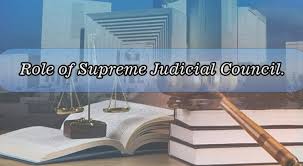By Asif Naveed
ISLAMABAD; The Supreme Court (SC) has clarified that only the Supreme Judicial Council (SJC) is constitutionally empowered to investigate allegations of misconduct against judges of the apex and high courts. The ruling came in a detailed verdict issued on Wednesday in connection with contempt proceedings against Additional Registrar (Judicial) Nazar Abbas.
In January, three SC judges had initiated contempt action against Abbas for allegedly failing to fix a case concerning the jurisdiction of regular benches. The dispute centered on whether regular benches of the Supreme Court could determine the constitutionality of Article 191A, introduced after the 26th Amendment, which established the Constitutional Bench.
The judgment explained that Article 199(5) of the Constitution grants immunity to superior court judges for actions performed within their judicial or administrative roles. This immunity, the bench observed, is intended to protect judicial independence under Article 2A of the Constitution. It added that no judge of the same court can issue writs or initiate action against another judge.
The order questioned how a sitting judge could face contempt proceedings under Article 204(2) initiated by a peer when constitutional protections expressly bar such measures. The ruling stressed that judges of the Supreme Court and high courts are not answerable to colleagues within the same institution.
However, the court noted that judicial immunity is not absolute. While it safeguards judges in the performance of judicial and administrative duties, it does not exempt them from accountability in cases of misconduct. Such matters, the verdict held, fall exclusively under the jurisdiction of the SJC, as laid out in Article 209 of the Constitution.
Citing Article 209(7), the judgment concluded that no other forum can inquire into allegations of misconduct against superior court judges, reaffirming this as a core constitutional safeguard.
























